Comparative Analysis of Entrepreneurial Ventures
VerifiedAdded on 2020/10/22
|11
|2780
|419
AI Summary
The provided study concludes that different types of organisations play a vital role in business growth, aiming to provide quality products and services. Small businesses and start-up companies contribute significantly to the growth of social economy by promoting corporate social responsibility and sustainability. Public sector companies focus on helping society rather than earning profits. The assignment highlights similarities and differences between these entrepreneurial ventures.
Contribute Materials
Your contribution can guide someone’s learning journey. Share your
documents today.

ENTREPRENEURSHIP
AND SMALL BUSINESS
MANAGEMENT
AND SMALL BUSINESS
MANAGEMENT
Secure Best Marks with AI Grader
Need help grading? Try our AI Grader for instant feedback on your assignments.
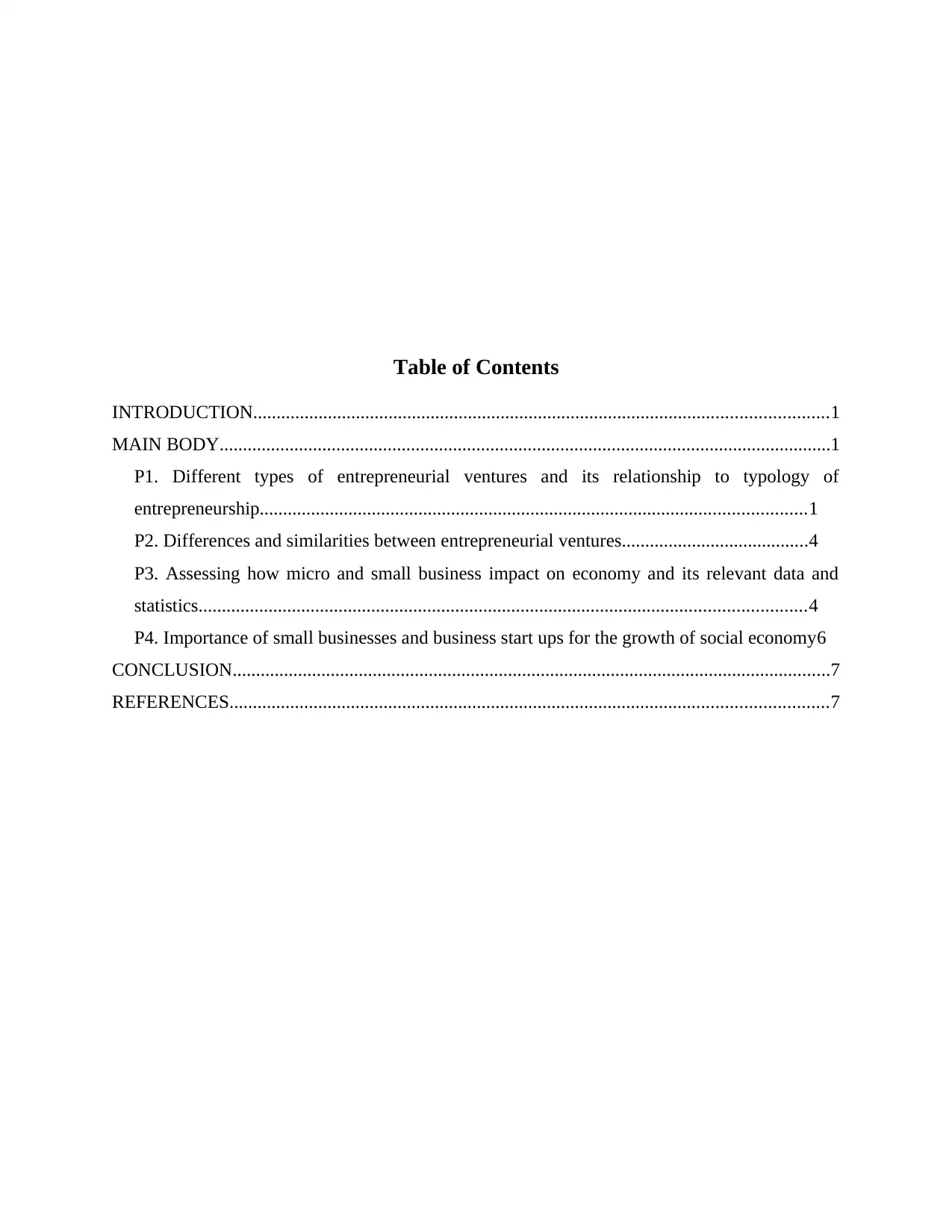
Table of Contents
INTRODUCTION...........................................................................................................................1
MAIN BODY...................................................................................................................................1
P1. Different types of entrepreneurial ventures and its relationship to typology of
entrepreneurship.....................................................................................................................1
P2. Differences and similarities between entrepreneurial ventures........................................4
P3. Assessing how micro and small business impact on economy and its relevant data and
statistics..................................................................................................................................4
P4. Importance of small businesses and business start ups for the growth of social economy6
CONCLUSION................................................................................................................................7
REFERENCES................................................................................................................................7
INTRODUCTION...........................................................................................................................1
MAIN BODY...................................................................................................................................1
P1. Different types of entrepreneurial ventures and its relationship to typology of
entrepreneurship.....................................................................................................................1
P2. Differences and similarities between entrepreneurial ventures........................................4
P3. Assessing how micro and small business impact on economy and its relevant data and
statistics..................................................................................................................................4
P4. Importance of small businesses and business start ups for the growth of social economy6
CONCLUSION................................................................................................................................7
REFERENCES................................................................................................................................7

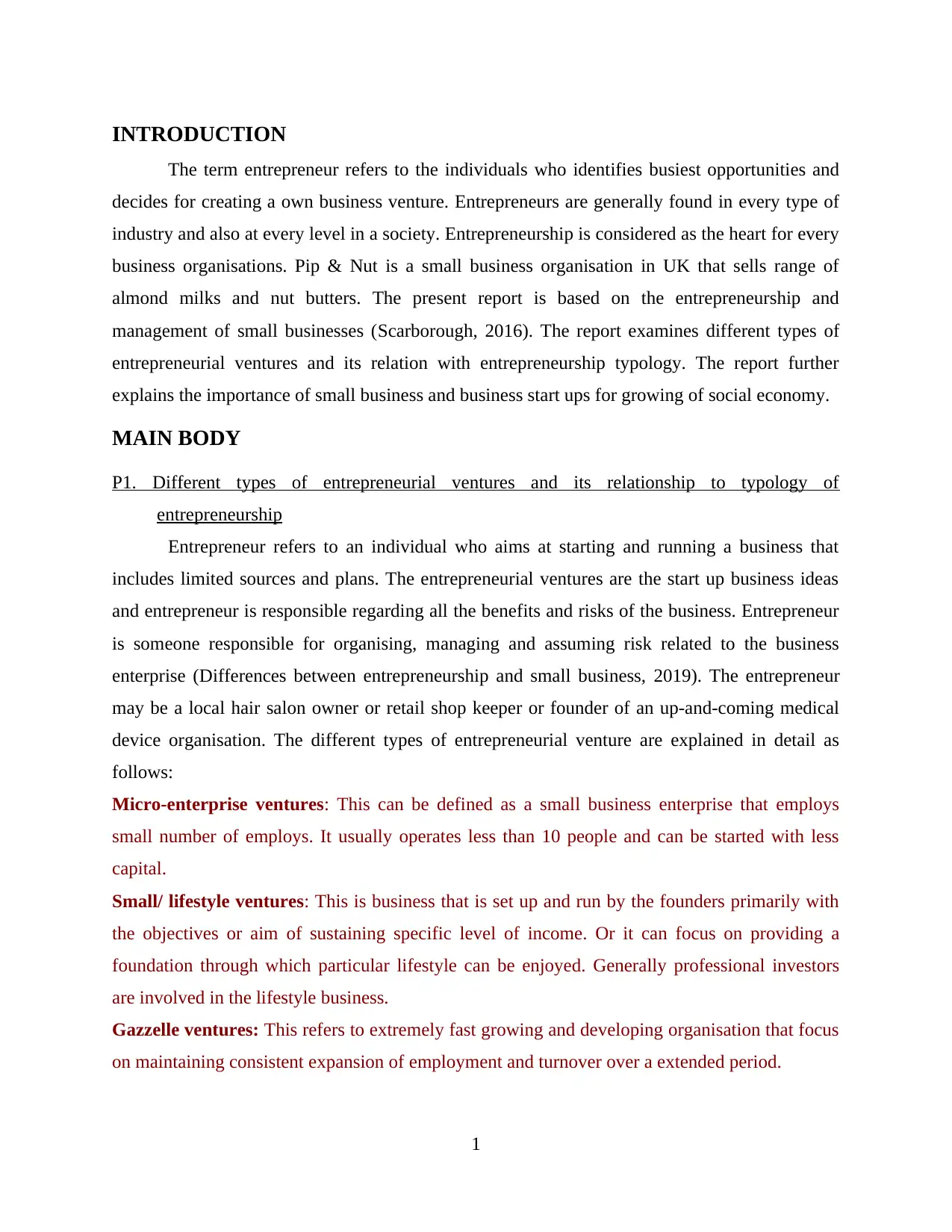
INTRODUCTION
The term entrepreneur refers to the individuals who identifies busiest opportunities and
decides for creating a own business venture. Entrepreneurs are generally found in every type of
industry and also at every level in a society. Entrepreneurship is considered as the heart for every
business organisations. Pip & Nut is a small business organisation in UK that sells range of
almond milks and nut butters. The present report is based on the entrepreneurship and
management of small businesses (Scarborough, 2016). The report examines different types of
entrepreneurial ventures and its relation with entrepreneurship typology. The report further
explains the importance of small business and business start ups for growing of social economy.
MAIN BODY
P1. Different types of entrepreneurial ventures and its relationship to typology of
entrepreneurship
Entrepreneur refers to an individual who aims at starting and running a business that
includes limited sources and plans. The entrepreneurial ventures are the start up business ideas
and entrepreneur is responsible regarding all the benefits and risks of the business. Entrepreneur
is someone responsible for organising, managing and assuming risk related to the business
enterprise (Differences between entrepreneurship and small business, 2019). The entrepreneur
may be a local hair salon owner or retail shop keeper or founder of an up-and-coming medical
device organisation. The different types of entrepreneurial venture are explained in detail as
follows:
Micro-enterprise ventures: This can be defined as a small business enterprise that employs
small number of employs. It usually operates less than 10 people and can be started with less
capital.
Small/ lifestyle ventures: This is business that is set up and run by the founders primarily with
the objectives or aim of sustaining specific level of income. Or it can focus on providing a
foundation through which particular lifestyle can be enjoyed. Generally professional investors
are involved in the lifestyle business.
Gazzelle ventures: This refers to extremely fast growing and developing organisation that focus
on maintaining consistent expansion of employment and turnover over a extended period.
1
The term entrepreneur refers to the individuals who identifies busiest opportunities and
decides for creating a own business venture. Entrepreneurs are generally found in every type of
industry and also at every level in a society. Entrepreneurship is considered as the heart for every
business organisations. Pip & Nut is a small business organisation in UK that sells range of
almond milks and nut butters. The present report is based on the entrepreneurship and
management of small businesses (Scarborough, 2016). The report examines different types of
entrepreneurial ventures and its relation with entrepreneurship typology. The report further
explains the importance of small business and business start ups for growing of social economy.
MAIN BODY
P1. Different types of entrepreneurial ventures and its relationship to typology of
entrepreneurship
Entrepreneur refers to an individual who aims at starting and running a business that
includes limited sources and plans. The entrepreneurial ventures are the start up business ideas
and entrepreneur is responsible regarding all the benefits and risks of the business. Entrepreneur
is someone responsible for organising, managing and assuming risk related to the business
enterprise (Differences between entrepreneurship and small business, 2019). The entrepreneur
may be a local hair salon owner or retail shop keeper or founder of an up-and-coming medical
device organisation. The different types of entrepreneurial venture are explained in detail as
follows:
Micro-enterprise ventures: This can be defined as a small business enterprise that employs
small number of employs. It usually operates less than 10 people and can be started with less
capital.
Small/ lifestyle ventures: This is business that is set up and run by the founders primarily with
the objectives or aim of sustaining specific level of income. Or it can focus on providing a
foundation through which particular lifestyle can be enjoyed. Generally professional investors
are involved in the lifestyle business.
Gazzelle ventures: This refers to extremely fast growing and developing organisation that focus
on maintaining consistent expansion of employment and turnover over a extended period.
1
Secure Best Marks with AI Grader
Need help grading? Try our AI Grader for instant feedback on your assignments.
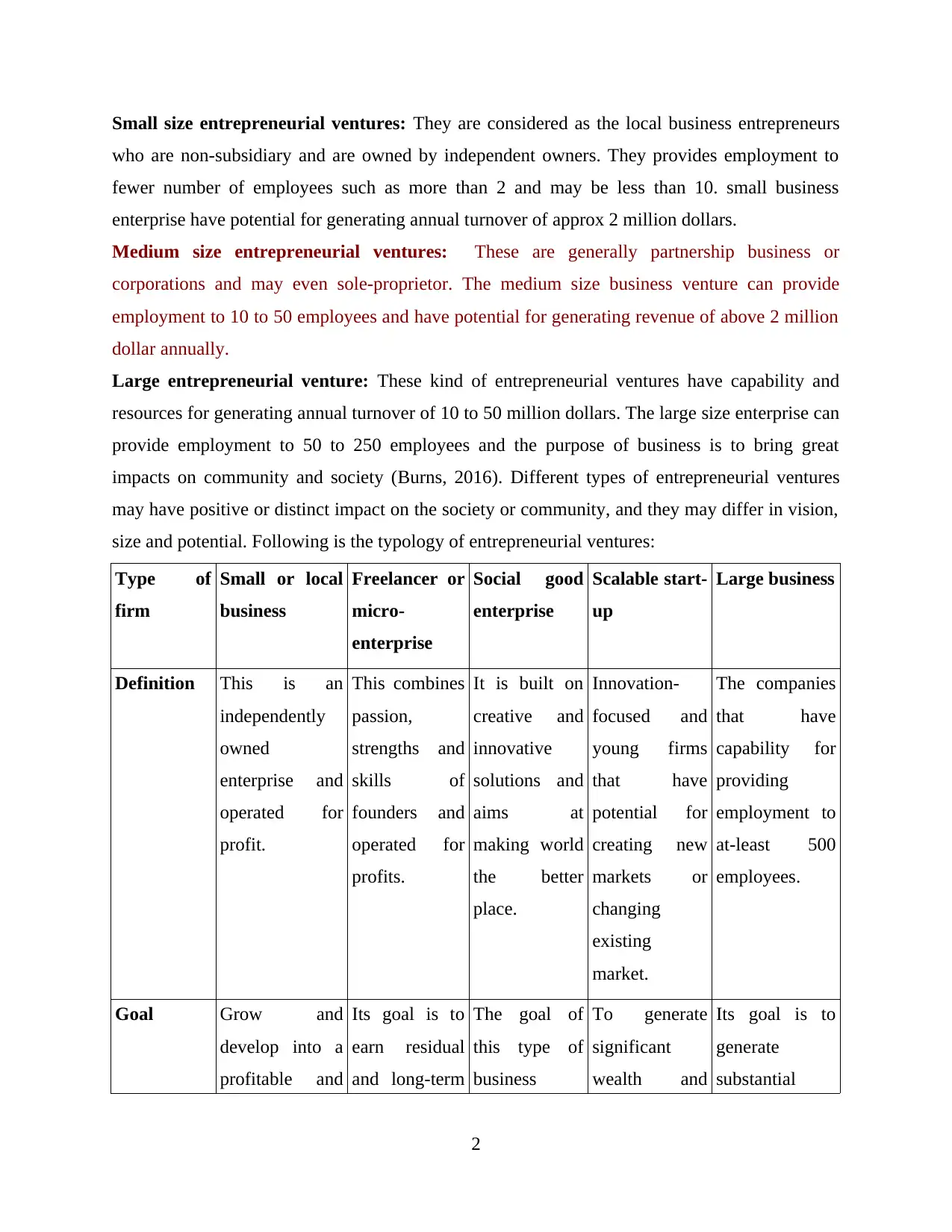
Small size entrepreneurial ventures: They are considered as the local business entrepreneurs
who are non-subsidiary and are owned by independent owners. They provides employment to
fewer number of employees such as more than 2 and may be less than 10. small business
enterprise have potential for generating annual turnover of approx 2 million dollars.
Medium size entrepreneurial ventures: These are generally partnership business or
corporations and may even sole-proprietor. The medium size business venture can provide
employment to 10 to 50 employees and have potential for generating revenue of above 2 million
dollar annually.
Large entrepreneurial venture: These kind of entrepreneurial ventures have capability and
resources for generating annual turnover of 10 to 50 million dollars. The large size enterprise can
provide employment to 50 to 250 employees and the purpose of business is to bring great
impacts on community and society (Burns, 2016). Different types of entrepreneurial ventures
may have positive or distinct impact on the society or community, and they may differ in vision,
size and potential. Following is the typology of entrepreneurial ventures:
Type of
firm
Small or local
business
Freelancer or
micro-
enterprise
Social good
enterprise
Scalable start-
up
Large business
Definition This is an
independently
owned
enterprise and
operated for
profit.
This combines
passion,
strengths and
skills of
founders and
operated for
profits.
It is built on
creative and
innovative
solutions and
aims at
making world
the better
place.
Innovation-
focused and
young firms
that have
potential for
creating new
markets or
changing
existing
market.
The companies
that have
capability for
providing
employment to
at-least 500
employees.
Goal Grow and
develop into a
profitable and
Its goal is to
earn residual
and long-term
The goal of
this type of
business
To generate
significant
wealth and
Its goal is to
generate
substantial
2
who are non-subsidiary and are owned by independent owners. They provides employment to
fewer number of employees such as more than 2 and may be less than 10. small business
enterprise have potential for generating annual turnover of approx 2 million dollars.
Medium size entrepreneurial ventures: These are generally partnership business or
corporations and may even sole-proprietor. The medium size business venture can provide
employment to 10 to 50 employees and have potential for generating revenue of above 2 million
dollar annually.
Large entrepreneurial venture: These kind of entrepreneurial ventures have capability and
resources for generating annual turnover of 10 to 50 million dollars. The large size enterprise can
provide employment to 50 to 250 employees and the purpose of business is to bring great
impacts on community and society (Burns, 2016). Different types of entrepreneurial ventures
may have positive or distinct impact on the society or community, and they may differ in vision,
size and potential. Following is the typology of entrepreneurial ventures:
Type of
firm
Small or local
business
Freelancer or
micro-
enterprise
Social good
enterprise
Scalable start-
up
Large business
Definition This is an
independently
owned
enterprise and
operated for
profit.
This combines
passion,
strengths and
skills of
founders and
operated for
profits.
It is built on
creative and
innovative
solutions and
aims at
making world
the better
place.
Innovation-
focused and
young firms
that have
potential for
creating new
markets or
changing
existing
market.
The companies
that have
capability for
providing
employment to
at-least 500
employees.
Goal Grow and
develop into a
profitable and
Its goal is to
earn residual
and long-term
The goal of
this type of
business
To generate
significant
wealth and
Its goal is to
generate
substantial
2
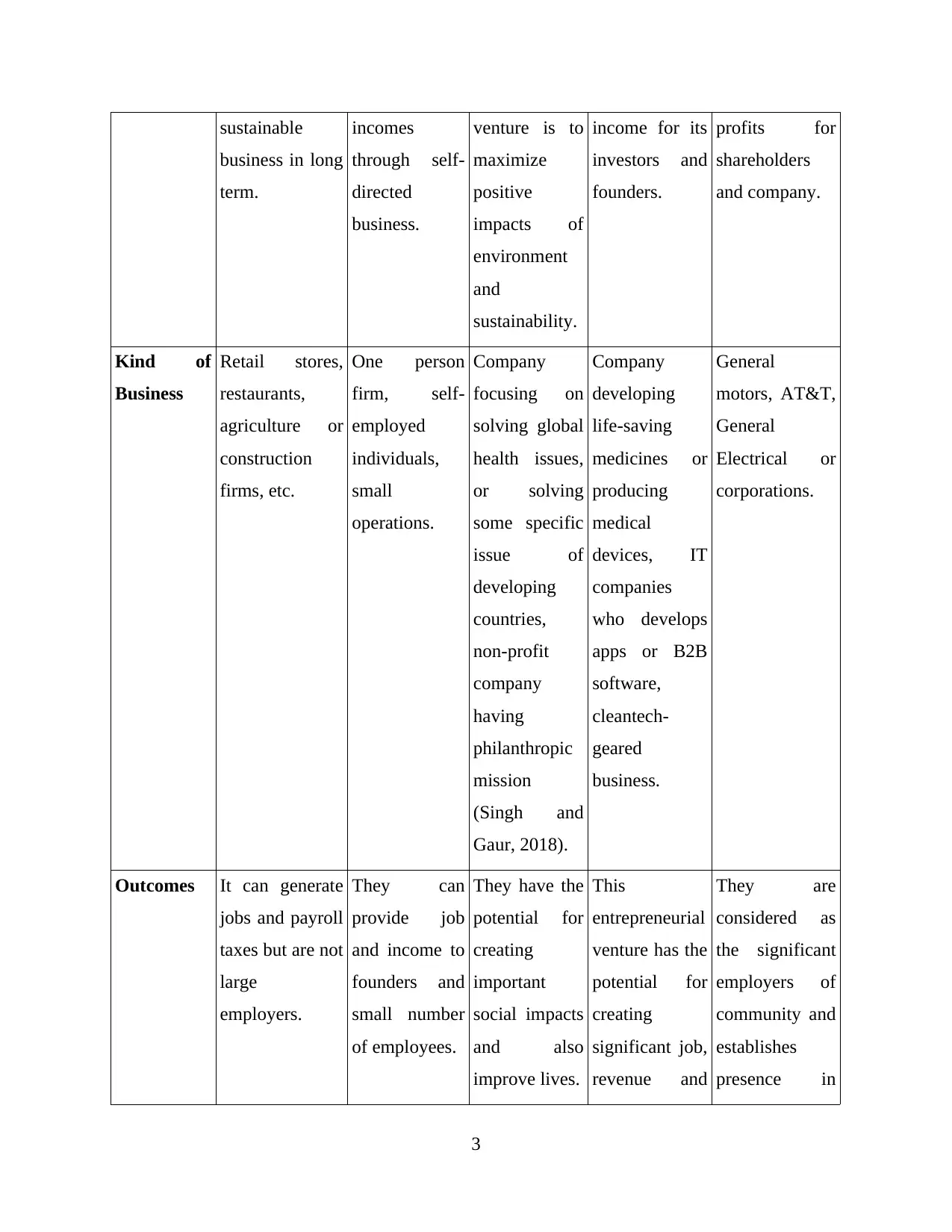
sustainable
business in long
term.
incomes
through self-
directed
business.
venture is to
maximize
positive
impacts of
environment
and
sustainability.
income for its
investors and
founders.
profits for
shareholders
and company.
Kind of
Business
Retail stores,
restaurants,
agriculture or
construction
firms, etc.
One person
firm, self-
employed
individuals,
small
operations.
Company
focusing on
solving global
health issues,
or solving
some specific
issue of
developing
countries,
non-profit
company
having
philanthropic
mission
(Singh and
Gaur, 2018).
Company
developing
life-saving
medicines or
producing
medical
devices, IT
companies
who develops
apps or B2B
software,
cleantech-
geared
business.
General
motors, AT&T,
General
Electrical or
corporations.
Outcomes It can generate
jobs and payroll
taxes but are not
large
employers.
They can
provide job
and income to
founders and
small number
of employees.
They have the
potential for
creating
important
social impacts
and also
improve lives.
This
entrepreneurial
venture has the
potential for
creating
significant job,
revenue and
They are
considered as
the significant
employers of
community and
establishes
presence in
3
business in long
term.
incomes
through self-
directed
business.
venture is to
maximize
positive
impacts of
environment
and
sustainability.
income for its
investors and
founders.
profits for
shareholders
and company.
Kind of
Business
Retail stores,
restaurants,
agriculture or
construction
firms, etc.
One person
firm, self-
employed
individuals,
small
operations.
Company
focusing on
solving global
health issues,
or solving
some specific
issue of
developing
countries,
non-profit
company
having
philanthropic
mission
(Singh and
Gaur, 2018).
Company
developing
life-saving
medicines or
producing
medical
devices, IT
companies
who develops
apps or B2B
software,
cleantech-
geared
business.
General
motors, AT&T,
General
Electrical or
corporations.
Outcomes It can generate
jobs and payroll
taxes but are not
large
employers.
They can
provide job
and income to
founders and
small number
of employees.
They have the
potential for
creating
important
social impacts
and also
improve lives.
This
entrepreneurial
venture has the
potential for
creating
significant job,
revenue and
They are
considered as
the significant
employers of
community and
establishes
presence in
3
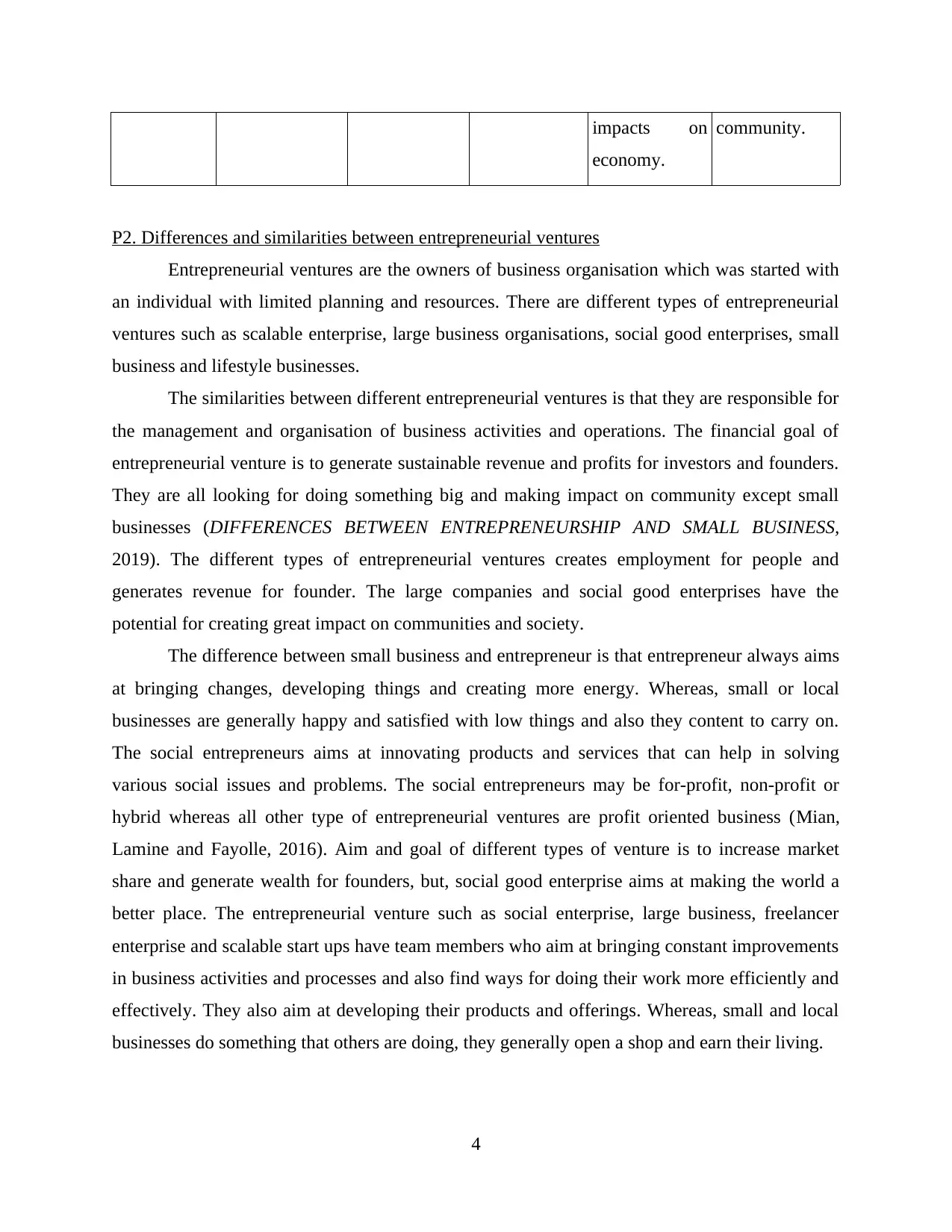
impacts on
economy.
community.
P2. Differences and similarities between entrepreneurial ventures
Entrepreneurial ventures are the owners of business organisation which was started with
an individual with limited planning and resources. There are different types of entrepreneurial
ventures such as scalable enterprise, large business organisations, social good enterprises, small
business and lifestyle businesses.
The similarities between different entrepreneurial ventures is that they are responsible for
the management and organisation of business activities and operations. The financial goal of
entrepreneurial venture is to generate sustainable revenue and profits for investors and founders.
They are all looking for doing something big and making impact on community except small
businesses (DIFFERENCES BETWEEN ENTREPRENEURSHIP AND SMALL BUSINESS,
2019). The different types of entrepreneurial ventures creates employment for people and
generates revenue for founder. The large companies and social good enterprises have the
potential for creating great impact on communities and society.
The difference between small business and entrepreneur is that entrepreneur always aims
at bringing changes, developing things and creating more energy. Whereas, small or local
businesses are generally happy and satisfied with low things and also they content to carry on.
The social entrepreneurs aims at innovating products and services that can help in solving
various social issues and problems. The social entrepreneurs may be for-profit, non-profit or
hybrid whereas all other type of entrepreneurial ventures are profit oriented business (Mian,
Lamine and Fayolle, 2016). Aim and goal of different types of venture is to increase market
share and generate wealth for founders, but, social good enterprise aims at making the world a
better place. The entrepreneurial venture such as social enterprise, large business, freelancer
enterprise and scalable start ups have team members who aim at bringing constant improvements
in business activities and processes and also find ways for doing their work more efficiently and
effectively. They also aim at developing their products and offerings. Whereas, small and local
businesses do something that others are doing, they generally open a shop and earn their living.
4
economy.
community.
P2. Differences and similarities between entrepreneurial ventures
Entrepreneurial ventures are the owners of business organisation which was started with
an individual with limited planning and resources. There are different types of entrepreneurial
ventures such as scalable enterprise, large business organisations, social good enterprises, small
business and lifestyle businesses.
The similarities between different entrepreneurial ventures is that they are responsible for
the management and organisation of business activities and operations. The financial goal of
entrepreneurial venture is to generate sustainable revenue and profits for investors and founders.
They are all looking for doing something big and making impact on community except small
businesses (DIFFERENCES BETWEEN ENTREPRENEURSHIP AND SMALL BUSINESS,
2019). The different types of entrepreneurial ventures creates employment for people and
generates revenue for founder. The large companies and social good enterprises have the
potential for creating great impact on communities and society.
The difference between small business and entrepreneur is that entrepreneur always aims
at bringing changes, developing things and creating more energy. Whereas, small or local
businesses are generally happy and satisfied with low things and also they content to carry on.
The social entrepreneurs aims at innovating products and services that can help in solving
various social issues and problems. The social entrepreneurs may be for-profit, non-profit or
hybrid whereas all other type of entrepreneurial ventures are profit oriented business (Mian,
Lamine and Fayolle, 2016). Aim and goal of different types of venture is to increase market
share and generate wealth for founders, but, social good enterprise aims at making the world a
better place. The entrepreneurial venture such as social enterprise, large business, freelancer
enterprise and scalable start ups have team members who aim at bringing constant improvements
in business activities and processes and also find ways for doing their work more efficiently and
effectively. They also aim at developing their products and offerings. Whereas, small and local
businesses do something that others are doing, they generally open a shop and earn their living.
4
Paraphrase This Document
Need a fresh take? Get an instant paraphrase of this document with our AI Paraphraser
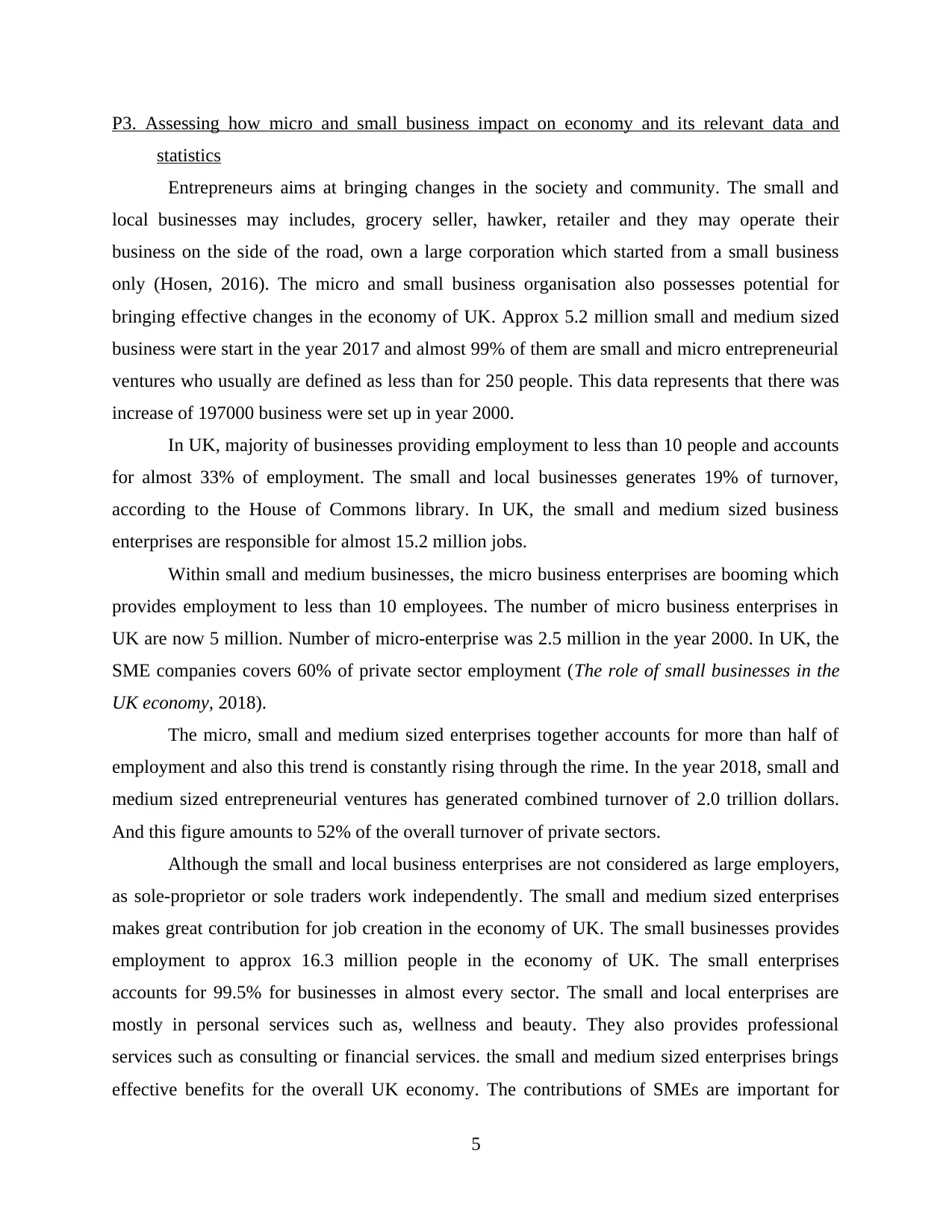
P3. Assessing how micro and small business impact on economy and its relevant data and
statistics
Entrepreneurs aims at bringing changes in the society and community. The small and
local businesses may includes, grocery seller, hawker, retailer and they may operate their
business on the side of the road, own a large corporation which started from a small business
only (Hosen, 2016). The micro and small business organisation also possesses potential for
bringing effective changes in the economy of UK. Approx 5.2 million small and medium sized
business were start in the year 2017 and almost 99% of them are small and micro entrepreneurial
ventures who usually are defined as less than for 250 people. This data represents that there was
increase of 197000 business were set up in year 2000.
In UK, majority of businesses providing employment to less than 10 people and accounts
for almost 33% of employment. The small and local businesses generates 19% of turnover,
according to the House of Commons library. In UK, the small and medium sized business
enterprises are responsible for almost 15.2 million jobs.
Within small and medium businesses, the micro business enterprises are booming which
provides employment to less than 10 employees. The number of micro business enterprises in
UK are now 5 million. Number of micro-enterprise was 2.5 million in the year 2000. In UK, the
SME companies covers 60% of private sector employment (The role of small businesses in the
UK economy, 2018).
The micro, small and medium sized enterprises together accounts for more than half of
employment and also this trend is constantly rising through the rime. In the year 2018, small and
medium sized entrepreneurial ventures has generated combined turnover of 2.0 trillion dollars.
And this figure amounts to 52% of the overall turnover of private sectors.
Although the small and local business enterprises are not considered as large employers,
as sole-proprietor or sole traders work independently. The small and medium sized enterprises
makes great contribution for job creation in the economy of UK. The small businesses provides
employment to approx 16.3 million people in the economy of UK. The small enterprises
accounts for 99.5% for businesses in almost every sector. The small and local enterprises are
mostly in personal services such as, wellness and beauty. They also provides professional
services such as consulting or financial services. the small and medium sized enterprises brings
effective benefits for the overall UK economy. The contributions of SMEs are important for
5
statistics
Entrepreneurs aims at bringing changes in the society and community. The small and
local businesses may includes, grocery seller, hawker, retailer and they may operate their
business on the side of the road, own a large corporation which started from a small business
only (Hosen, 2016). The micro and small business organisation also possesses potential for
bringing effective changes in the economy of UK. Approx 5.2 million small and medium sized
business were start in the year 2017 and almost 99% of them are small and micro entrepreneurial
ventures who usually are defined as less than for 250 people. This data represents that there was
increase of 197000 business were set up in year 2000.
In UK, majority of businesses providing employment to less than 10 people and accounts
for almost 33% of employment. The small and local businesses generates 19% of turnover,
according to the House of Commons library. In UK, the small and medium sized business
enterprises are responsible for almost 15.2 million jobs.
Within small and medium businesses, the micro business enterprises are booming which
provides employment to less than 10 employees. The number of micro business enterprises in
UK are now 5 million. Number of micro-enterprise was 2.5 million in the year 2000. In UK, the
SME companies covers 60% of private sector employment (The role of small businesses in the
UK economy, 2018).
The micro, small and medium sized enterprises together accounts for more than half of
employment and also this trend is constantly rising through the rime. In the year 2018, small and
medium sized entrepreneurial ventures has generated combined turnover of 2.0 trillion dollars.
And this figure amounts to 52% of the overall turnover of private sectors.
Although the small and local business enterprises are not considered as large employers,
as sole-proprietor or sole traders work independently. The small and medium sized enterprises
makes great contribution for job creation in the economy of UK. The small businesses provides
employment to approx 16.3 million people in the economy of UK. The small enterprises
accounts for 99.5% for businesses in almost every sector. The small and local enterprises are
mostly in personal services such as, wellness and beauty. They also provides professional
services such as consulting or financial services. the small and medium sized enterprises brings
effective benefits for the overall UK economy. The contributions of SMEs are important for
5
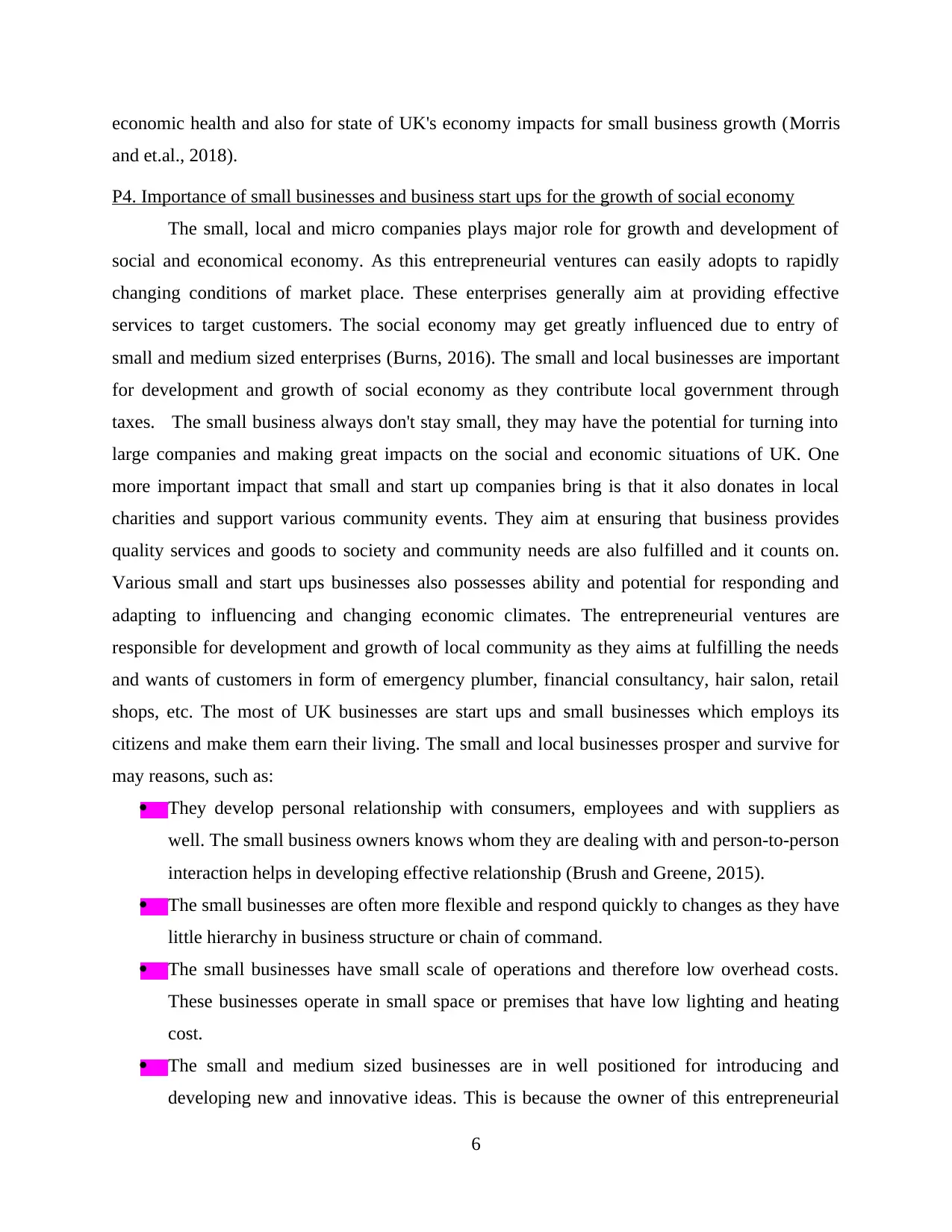
economic health and also for state of UK's economy impacts for small business growth (Morris
and et.al., 2018).
P4. Importance of small businesses and business start ups for the growth of social economy
The small, local and micro companies plays major role for growth and development of
social and economical economy. As this entrepreneurial ventures can easily adopts to rapidly
changing conditions of market place. These enterprises generally aim at providing effective
services to target customers. The social economy may get greatly influenced due to entry of
small and medium sized enterprises (Burns, 2016). The small and local businesses are important
for development and growth of social economy as they contribute local government through
taxes. The small business always don't stay small, they may have the potential for turning into
large companies and making great impacts on the social and economic situations of UK. One
more important impact that small and start up companies bring is that it also donates in local
charities and support various community events. They aim at ensuring that business provides
quality services and goods to society and community needs are also fulfilled and it counts on.
Various small and start ups businesses also possesses ability and potential for responding and
adapting to influencing and changing economic climates. The entrepreneurial ventures are
responsible for development and growth of local community as they aims at fulfilling the needs
and wants of customers in form of emergency plumber, financial consultancy, hair salon, retail
shops, etc. The most of UK businesses are start ups and small businesses which employs its
citizens and make them earn their living. The small and local businesses prosper and survive for
may reasons, such as:
They develop personal relationship with consumers, employees and with suppliers as
well. The small business owners knows whom they are dealing with and person-to-person
interaction helps in developing effective relationship (Brush and Greene, 2015).
The small businesses are often more flexible and respond quickly to changes as they have
little hierarchy in business structure or chain of command.
The small businesses have small scale of operations and therefore low overhead costs.
These businesses operate in small space or premises that have low lighting and heating
cost.
The small and medium sized businesses are in well positioned for introducing and
developing new and innovative ideas. This is because the owner of this entrepreneurial
6
and et.al., 2018).
P4. Importance of small businesses and business start ups for the growth of social economy
The small, local and micro companies plays major role for growth and development of
social and economical economy. As this entrepreneurial ventures can easily adopts to rapidly
changing conditions of market place. These enterprises generally aim at providing effective
services to target customers. The social economy may get greatly influenced due to entry of
small and medium sized enterprises (Burns, 2016). The small and local businesses are important
for development and growth of social economy as they contribute local government through
taxes. The small business always don't stay small, they may have the potential for turning into
large companies and making great impacts on the social and economic situations of UK. One
more important impact that small and start up companies bring is that it also donates in local
charities and support various community events. They aim at ensuring that business provides
quality services and goods to society and community needs are also fulfilled and it counts on.
Various small and start ups businesses also possesses ability and potential for responding and
adapting to influencing and changing economic climates. The entrepreneurial ventures are
responsible for development and growth of local community as they aims at fulfilling the needs
and wants of customers in form of emergency plumber, financial consultancy, hair salon, retail
shops, etc. The most of UK businesses are start ups and small businesses which employs its
citizens and make them earn their living. The small and local businesses prosper and survive for
may reasons, such as:
They develop personal relationship with consumers, employees and with suppliers as
well. The small business owners knows whom they are dealing with and person-to-person
interaction helps in developing effective relationship (Brush and Greene, 2015).
The small businesses are often more flexible and respond quickly to changes as they have
little hierarchy in business structure or chain of command.
The small businesses have small scale of operations and therefore low overhead costs.
These businesses operate in small space or premises that have low lighting and heating
cost.
The small and medium sized businesses are in well positioned for introducing and
developing new and innovative ideas. This is because the owner of this entrepreneurial
6
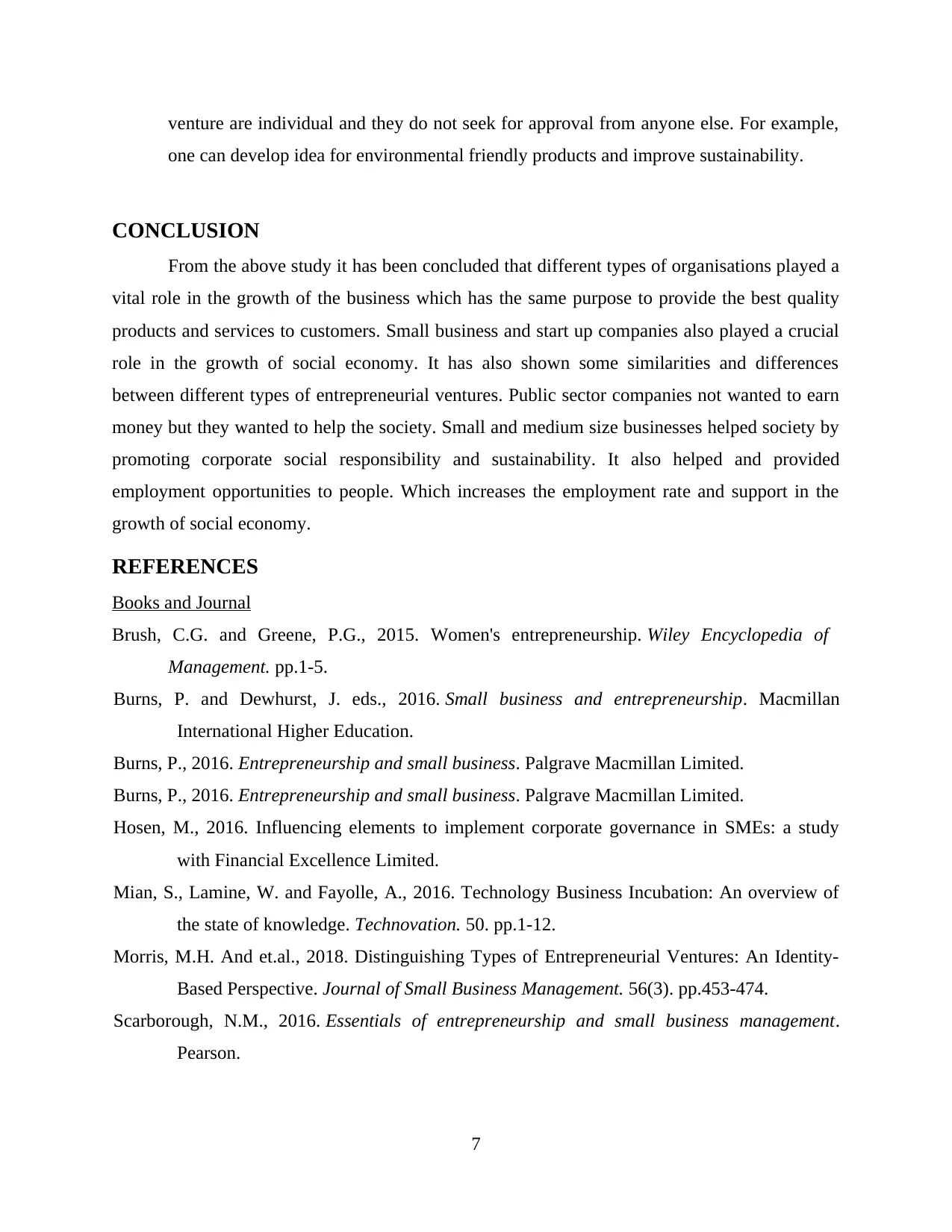
venture are individual and they do not seek for approval from anyone else. For example,
one can develop idea for environmental friendly products and improve sustainability.
CONCLUSION
From the above study it has been concluded that different types of organisations played a
vital role in the growth of the business which has the same purpose to provide the best quality
products and services to customers. Small business and start up companies also played a crucial
role in the growth of social economy. It has also shown some similarities and differences
between different types of entrepreneurial ventures. Public sector companies not wanted to earn
money but they wanted to help the society. Small and medium size businesses helped society by
promoting corporate social responsibility and sustainability. It also helped and provided
employment opportunities to people. Which increases the employment rate and support in the
growth of social economy.
REFERENCES
Books and Journal
Brush, C.G. and Greene, P.G., 2015. Women's entrepreneurship. Wiley Encyclopedia of
Management. pp.1-5.
Burns, P. and Dewhurst, J. eds., 2016. Small business and entrepreneurship. Macmillan
International Higher Education.
Burns, P., 2016. Entrepreneurship and small business. Palgrave Macmillan Limited.
Burns, P., 2016. Entrepreneurship and small business. Palgrave Macmillan Limited.
Hosen, M., 2016. Influencing elements to implement corporate governance in SMEs: a study
with Financial Excellence Limited.
Mian, S., Lamine, W. and Fayolle, A., 2016. Technology Business Incubation: An overview of
the state of knowledge. Technovation. 50. pp.1-12.
Morris, M.H. And et.al., 2018. Distinguishing Types of Entrepreneurial Ventures: An Identity‐
Based Perspective. Journal of Small Business Management. 56(3). pp.453-474.
Scarborough, N.M., 2016. Essentials of entrepreneurship and small business management.
Pearson.
7
one can develop idea for environmental friendly products and improve sustainability.
CONCLUSION
From the above study it has been concluded that different types of organisations played a
vital role in the growth of the business which has the same purpose to provide the best quality
products and services to customers. Small business and start up companies also played a crucial
role in the growth of social economy. It has also shown some similarities and differences
between different types of entrepreneurial ventures. Public sector companies not wanted to earn
money but they wanted to help the society. Small and medium size businesses helped society by
promoting corporate social responsibility and sustainability. It also helped and provided
employment opportunities to people. Which increases the employment rate and support in the
growth of social economy.
REFERENCES
Books and Journal
Brush, C.G. and Greene, P.G., 2015. Women's entrepreneurship. Wiley Encyclopedia of
Management. pp.1-5.
Burns, P. and Dewhurst, J. eds., 2016. Small business and entrepreneurship. Macmillan
International Higher Education.
Burns, P., 2016. Entrepreneurship and small business. Palgrave Macmillan Limited.
Burns, P., 2016. Entrepreneurship and small business. Palgrave Macmillan Limited.
Hosen, M., 2016. Influencing elements to implement corporate governance in SMEs: a study
with Financial Excellence Limited.
Mian, S., Lamine, W. and Fayolle, A., 2016. Technology Business Incubation: An overview of
the state of knowledge. Technovation. 50. pp.1-12.
Morris, M.H. And et.al., 2018. Distinguishing Types of Entrepreneurial Ventures: An Identity‐
Based Perspective. Journal of Small Business Management. 56(3). pp.453-474.
Scarborough, N.M., 2016. Essentials of entrepreneurship and small business management.
Pearson.
7
Secure Best Marks with AI Grader
Need help grading? Try our AI Grader for instant feedback on your assignments.
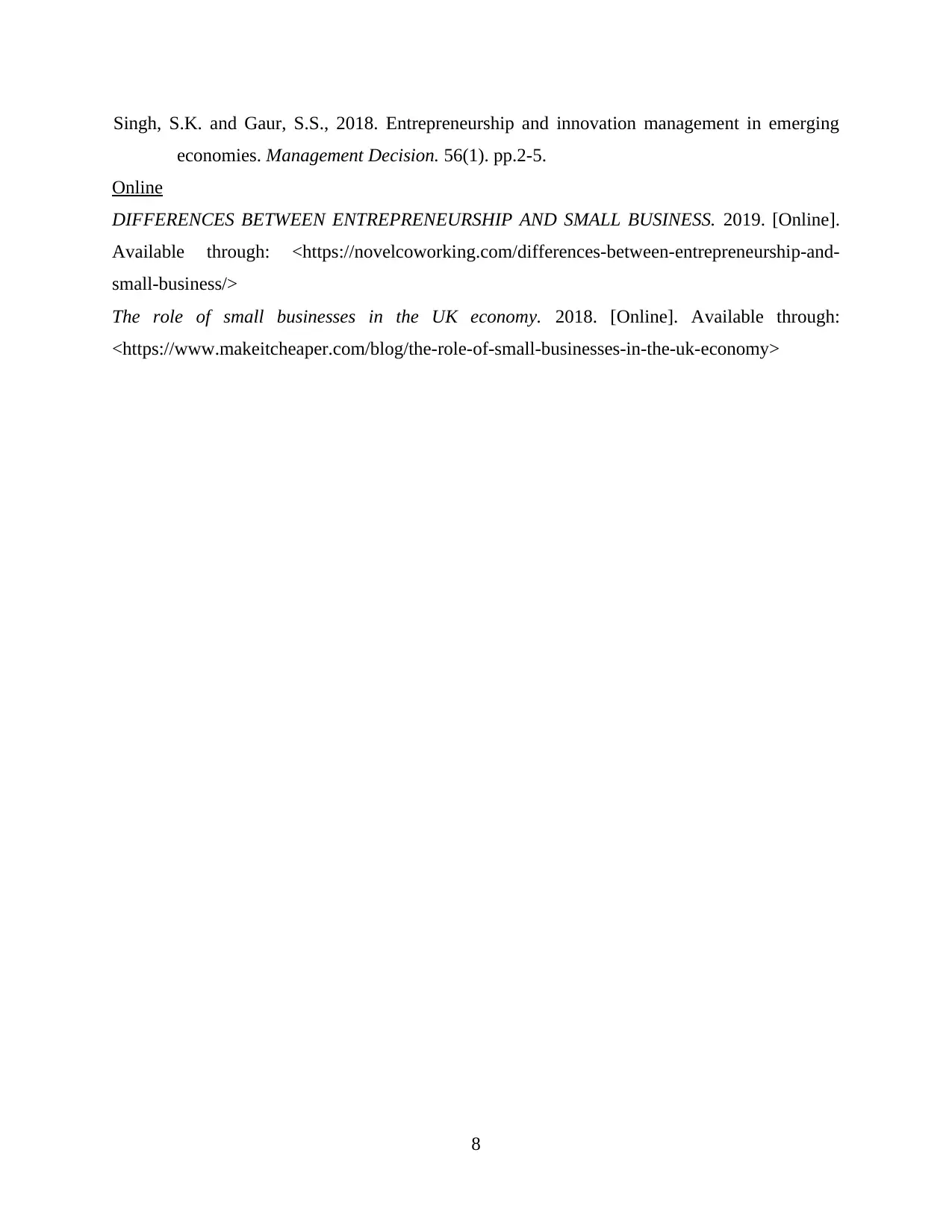
Singh, S.K. and Gaur, S.S., 2018. Entrepreneurship and innovation management in emerging
economies. Management Decision. 56(1). pp.2-5.
Online
DIFFERENCES BETWEEN ENTREPRENEURSHIP AND SMALL BUSINESS. 2019. [Online].
Available through: <https://novelcoworking.com/differences-between-entrepreneurship-and-
small-business/>
The role of small businesses in the UK economy. 2018. [Online]. Available through:
<https://www.makeitcheaper.com/blog/the-role-of-small-businesses-in-the-uk-economy>
8
economies. Management Decision. 56(1). pp.2-5.
Online
DIFFERENCES BETWEEN ENTREPRENEURSHIP AND SMALL BUSINESS. 2019. [Online].
Available through: <https://novelcoworking.com/differences-between-entrepreneurship-and-
small-business/>
The role of small businesses in the UK economy. 2018. [Online]. Available through:
<https://www.makeitcheaper.com/blog/the-role-of-small-businesses-in-the-uk-economy>
8
1 out of 11
Related Documents
Your All-in-One AI-Powered Toolkit for Academic Success.
+13062052269
info@desklib.com
Available 24*7 on WhatsApp / Email
![[object Object]](/_next/static/media/star-bottom.7253800d.svg)
Unlock your academic potential
© 2024 | Zucol Services PVT LTD | All rights reserved.




